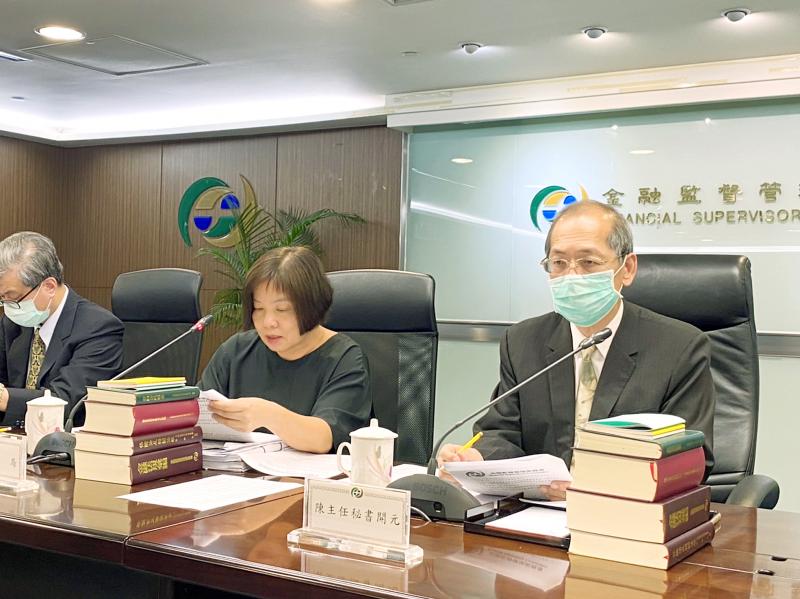The Financial Supervisory Commission (FSC) yesterday fined Shin Kong Life Insurance Co (新光人壽) NT$27.6 million (US$939,415) for a reckless investment that endangered its solvency, and suspended its chairman Eugene Wu (吳東進) for poor supervision.
The penalty is the second-highest in a single case after Nan Shan Life Insurance Co (南山人壽) was fined NT$30 million in September last year and its chairman Du Ying-tzyong (杜英宗) suspended for two years, the commission said.
In three rounds of special and regular examinations conducted since last year, the commission found that Shin Kong Life had given too much power to an asset and liability management committee on investment decisions, without any checks, Insurance Bureau Director-General Shih Chiung-hwa (施瓊華) told a news conference in New Taipei City.

Photo: Kao Shih-ching, Taipei Times
The committee, led by Wu, increased its investment by NT$96.66 billion in several US stocks and exchange-traded funds in two consecutive days in January, ignoring warnings from the insurer’s risk management department, Shih said.
However, as US stocks tumbled, the insurer’s value-at-risk, a measure of the risk of investment loss given market conditions, increased to 43.33 percent by the end of March 27, which was 2.75 times higher than the 15.73 percent limit set by the insurer’s board members, Shih added.
The investment also caused the insurer’s equity-to-asset ratio, a key solvency gauge, to fall to 2.2 percent as of the end of March, below the regulatory minimum of 3 percent, she added.
“Even though the firm’s risk-based capital ratio dropped below the board member’s goal of 250 percent, the committee did not discuss how to improve it. There were no minutes of the committee’s meetings, which indicates poor internal controls,” Shih said.
Wu, who should have ensured the firm’s financial strength and solvency, on the contrary weakened them by allowing the committee not to report to the board of directors and appointing more than half of the committee’s 16 members, so the commission suspended his chairmanship and barred him from becoming a board member until his term ends in June 2023, she said.
“We expect the insurance company to get back on track by overhauling its mechanisms for investment and risk management while Wu is absent,” Shih said.
The commission also dismissed Shin Kong Life vice president and chief investment officer James Yuan (袁宏隆), as he ignored risks by taking on fixed-income stocks with poor liquidity, asking the firm’s research team to revise reports so that the investment team could invest in targets and make at-the-close orders in the local stock market to boost its asset valuations.
The commission said that it has lowered the insurer’s ratio of overseas investment to a total investment of 39 percent, from 43 percent, which means that the firm can only sell its foreign assets and cannot buy any new targets until the ratio drops, it added.
The commission did not set a deadline for Shin Kong Life to trim the ratio, but demanded that it not buy any local or foreign stocks and exchange-traded funds before the adjustment is completed, Shih said.

South Korea’s equity benchmark yesterday crossed a new milestone just a month after surpassing the once-unthinkable 5,000 mark as surging global memory demand powers the country’s biggest chipmakers. The KOSPI advanced as much as 2.6 percent to a record 6,123, with Samsung Electronics Co and SK Hynix Inc each gaining more than 2 percent. With the benchmark now up 45 percent this year, South Korea’s stock market capitalization has also moved past France’s, following last month’s overtaking of Germany’s. Long overlooked by foreign funds, despite being undervalued, South Korean stocks have now emerged as clear winners in the global market. The so-called “artificial intelligence

‘SEISMIC SHIFT’: The researcher forecast there would be about 1.1 billion mobile shipments this year, down from 1.26 billion the prior year and erasing years of gains The global smartphone market is expected to contract 12.9 percent this year due to the unprecedented memorychip shortage, marking “a crisis like no other,” researcher International Data Corp (IDC) said. The new forecast, a dramatic revision down from earlier estimates, gives the latest accounting of the ongoing memory crunch that is affecting every corner of the electronics industry. The demand for advanced memory to power artificial intelligence (AI) tasks has drained global supply until well into next year and jeopardizes the business model of many smartphone makers. IDC forecast about 1.1 billion mobile shipments this year, down from 1.26 billion the prior

People stand in a Pokemon store in Tokyo on Thursday. One of the world highest-grossing franchises is celebrated its 30th anniversary yesterday.

Chinese artificial intelligence (AI) start-up DeepSeek’s (深度求索) latest AI model, set to be released as soon as next week, was trained on Nvidia Corp’s most advanced AI chip, the Blackwell, a senior official of US President Donald Trump’s administration said on Monday, in what could represent a violation of US export controls. The US believes DeepSeek will remove the technical indicators that might reveal its use of American AI chips, the official said, adding that the Blackwells are likely clustered at its data center in Inner Mongolia, an autonomous region of China. The person declined to say how the US government received